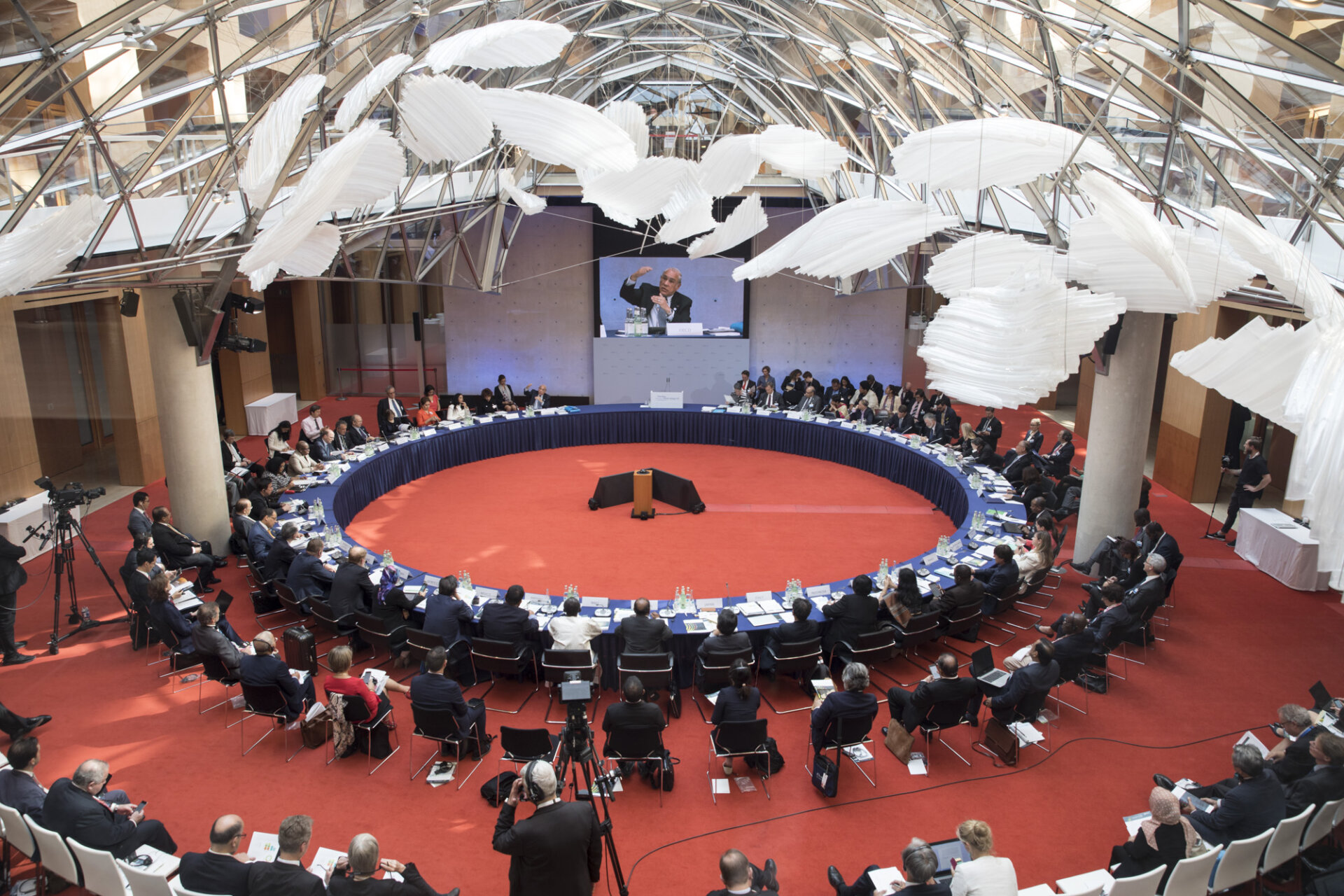The 15th Petersberg Climate Dialogue (PCD) takes place on 25-26 April in Berlin, marking a crucial moment in the diplomatic calendar. Bringing together ministers from around 40 countries, its aim is to advance towards an ambitious outcome at the UN Climate Change Conference (COP 29) in Baku, with a strong emphasis on finance. Germany, as the host, plays a critical role in driving forward negotiations.
Story
The PCD continues the steady drumbeat of international climate diplomacy on the Road to COP29 in Baku, following the Copenhagen Climate Ministerial in March and the Spring Meetings of the World Bank and International Monetary Fund in mid-April. This year’s PCD must set out expectations regarding a new collective goal for climate finance (NCQG) at COP29, progress conversations on financial system reform, and lay the groundwork for Nationally Determined Contribution (NDC) updates by early 2025, ahead of COP30 in Belem.
By COP29, developing countries must be confident that sufficient climate finance is available and accessible to support transitions and adaptation. Similarly, confidence is needed that, at a time of severely constrained budgets, finance will be utilised as effectively as possible. Limited progress since the Copenhagen Ministerial underscores the significance of this year’s PCD. Germany, as an engaged global climate leader and PCD host, has a special opportunity to drive discussions forward, maintain momentum and enable ambition at COP29 and COP30.
Unblocking Progress on international climate finance
The current international finance goal to mobilise $100bn per year by 2020, though likely reached two years behind schedule, expires in 2025. By 2030, developing countries outside China are estimated to require $2.4 trillion per year for climate and nature related investments.
Germany, as one of the largest climate finance contributors, should leverage its influence to advocate for an NCQG with increased public finance provision, clear sub-goals on mitigation, adaptation, and loss and damage, and transparent strategies for effectively leveraging private investment. It must also advocate for new contributions from innovative sources and closer alignment with the international financial architecture reform agenda. Being a significant shareholder of the World Bank and other Multilateral Development Banks (MDBs), Germany is well-positioned to take the lead in this area and has been one of the main drivers of the process thus far.
Ongoing discussions regarding government budget constraints have raised concerns about whether Germany’s goal to provide EUR 6bn climate finance per year from 2025 onwards will be reached. Chancellor Scholz should also use the opportunity to reaffirm Germany’s commitment to this goal.
In its Climate Foreign Policy Strategy, the government highlighted support for doubling international adaptation finance by 2025. Germany must, therefore, double its own contributions accordingly.
Such actions are crucial for fostering constructive conversations and strengthening Germany’s diplomatic leverage in conversations about expanding the donor base with high emitters such as China or Saudi Arabia.
Enabling ambitious Nationally Determined Contributions
According to the IPCC, global emissions must peak by the latest 2025 to stand a reasonable chance of limiting warming below 1.5 degrees. Currently, the political buy-in necessary to enable sufficient ambition is lacking, the world is not on track. PCD will need to set clear expectations on what is required to achieve this goal. This will include support on NDC design and delivery, tech know-how, and finance mobilisation to enable economy-wide 2035 mitigation and adaptation targets.
Germany should use the PCD to rally EU member states around early adoption of a robust and ambitious EU NDC, ideally during the upcoming European Council in June. This is fundamental to incentivise other big emitters to raise ambition ahead of COP30. Given recent successes in coal phase out and Germany’s progress towards reaching its 2030 targets, it has regained credibility. It should push other countries to match this ambition.
Maintaining momentum on the Road to Baku
It is important to maintain progress regarding these complex issues throughout the year and to capitalise on the high-level political moments between now and Baku. Immediately following the PCD, G7 Climate, Energy, and Environment Ministers meet in Turin under the Italian Presidency. Germany must be an active bridge between PCD, the G7 and the G20. G7 leadership will help the ambitious Brazilian G20 agenda and maintain the necessary pressure on all G20 members to enable a successful COP29.
Quotes
Marc Weissgerber, Executive Director at E3G, said:
“The next eighteen months until COP30 in Belem are the most consequential in this ‘critical decade’ for climate safety, and crucial for keeping the Paris Agreement alive. As host of the Petersberg Climate Dialogue, Germany must show leadership within the EU and in the world. It should rally EU member states to endorse an ambitious NDC update in June. Additionally, it must offer countries credible support – both financially and technically. Chancellor Olaf Scholz must reaffirm Germany’s commitment to contribute 6 billion Euros to climate finance despite Germany’s recent budget constraints.”
Steffen Menzel, Programme Lead at E3G, said:
“As host of the Petersberg Climate Dialogue, Germany has an exceptional opportunity to rally momentum and position itself as bridge builder between the Global North and the Global South. Reaching out to partners at eye-level not only provides an opportunity to strengthen Germany as a climate leader, but it also contributes to Germany’s own geopolitical interest of a multilateral system with common goals and rules.”
– ENDS –
Available for comment
Marc Weissgerber (DE, EN), Executive Director
m: +49 (0) 175 1974404 | marc.weissgerber@e3g.org
Steffen Menzel (DE, EN), Programme Lead
m: +49 151 51201182 | steffen.menzel@e3g.org
Notes to editors
- E3G is an independent climate change think tank with a global outlook. We work on the frontier of the climate landscape, tackling the barriers and advancing the solutions to a safe climate. Our goal is to translate climate politics, economics and policies into action. About – E3G
- For further enquiries email press@e3g.org.



